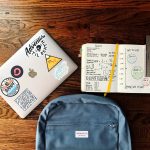All of your life, you have been learning new skills. When you were five years old, someone taught you how to tie your shoes. At age six, you learned how to ride a bike without training wheels. Fast forward to your pre-teen and teen years, and you might know several skateboard tricks, how to do your makeup and hair, or even cook a four-course meal for your family. What do all these skills have in common?
It took practice to master each one.
Study skills are no different. It may sound strange to study about study skills. But there are several study habits and tips that you can learn and practice. Learn to study smarter, not harder. You’ll see a difference at test time….guaranteed!

Smarter Studying Begins at School
The first study skills tip is to pay attention in class. If you are attentive during lessons, ask questions, and take notes, then you have begun studying already. If you find that you can’t focus or you sit near someone that distracts you, then request to move your seat.
Taking good notes increases the amount of material that you remember. For example, when listening to a lesson or lecture, write down any words or points that the teacher emphasizes. Further, anything the teacher writes on the board is important, so include these items in your notes. Going over your notes from the previous day just before class is very helpful and will make the class easier to follow.
Break It All Down. Divide and Conquer.
You may be tested over a large amount of content during one exam. If you have several days before the test, break the material you need to study into manageable chunks. Things like trying to pull an “all-nighter,” reading three or more chapters in one sitting, answering a ton of review questions, working a hundred practice problems, or memorizing dozens of definitions is not studying smart. Instead, look at the amount of material you need to study, divide it into parts, and study each night before the exam. It’s always good to allow time to briefly review what was previously learned the night before before you begin your study session.
Studying at Home
At home, set a time each day for studying and stick to it as close as possible. Think about what works for you. For example, some kids prefer to study right after school; others prefer to study later at night after dinner, or maybe in the morning before going to school.
Think about where you study. Having a quiet study space away from TV noise, other family members or distractions makes studying easier and more productive.
Memorization
Suppose you have a tons of dates, facts, or vocabulary to master before an exam. In that case, these study tips will help you memorize them more quickly.
- Make flashcards. Writing each fact or word down will help you remember them, even if you never review them. Of course you should go over them often. You can carry the cards with you and practice anywhere. It helps to keep a separate pile of the flashcards you got wrong and focus on them until you know them all well, but don’t forget to review them all once in a while. Using a highlighter marker on the key parts you need to remember can improve your recall. There are a lot of great online flashcard tools, like quizlet, but we think old fashion paper flashcards are often the best.
- Mnemonics. Create a silly sentence to remember facts. A well-known mnemonic for remembering the order of the planets is:
My Very Excellent Mother Just Served Us Noodles (Mercury, Venus, Excellent, Mars, Jupiter, Saturn, Uranus, Neptune)
Another one used to remember the order of math operations is:
Please Excuse My Dear Ant Sally (parenthesis, exponents, multiplication, division, addition, subtraction)
For many more examples, see the KidzSearch Wiki Mnemonics Article
3. Creating a rhyme or a song helps memorization too:
Six and eight went out on a date.
They then got married when they were forty-eight.
6X8=48
Get a Good Night’s Sleep
Studying is exhausting at times. You may think you aren’t learning or remembering what you need. A good night’s sleep helps. After a period of rest, you’ll be surprised at what you remember the next day. Studies show that during sleep the brain is still hard at work processing and sorting out information you studied to make it all come together better and improve recall during an exam.
Choose to Study Smarter
Choosing to use good study skills such as taking good notes, breaking the material down into manageable chunks, and finding a way to memorize more easily, are some ways to study smarter. With practice and sticking to your plan, you’ll see great results on your report card.

Online resources on study skills:







